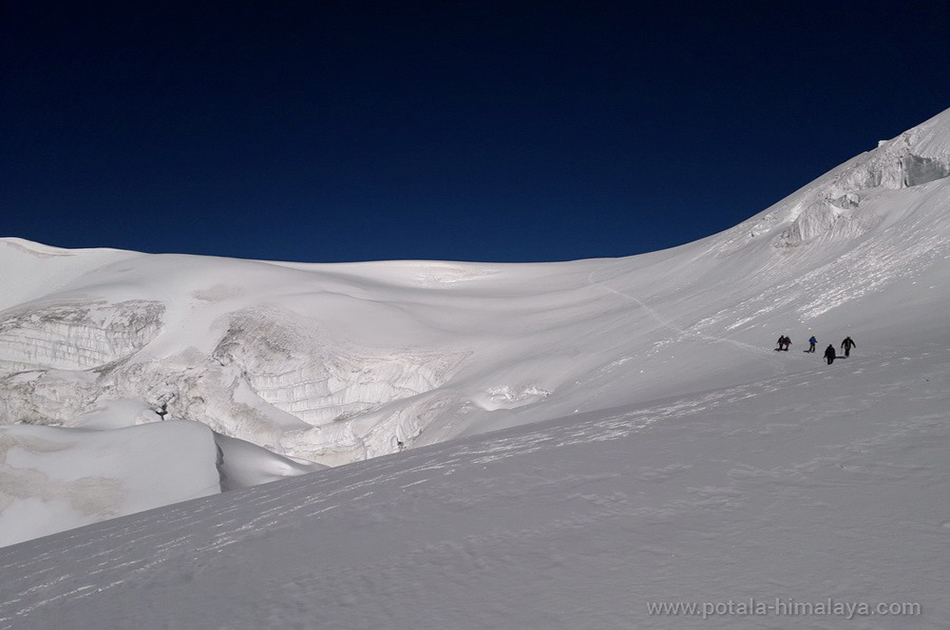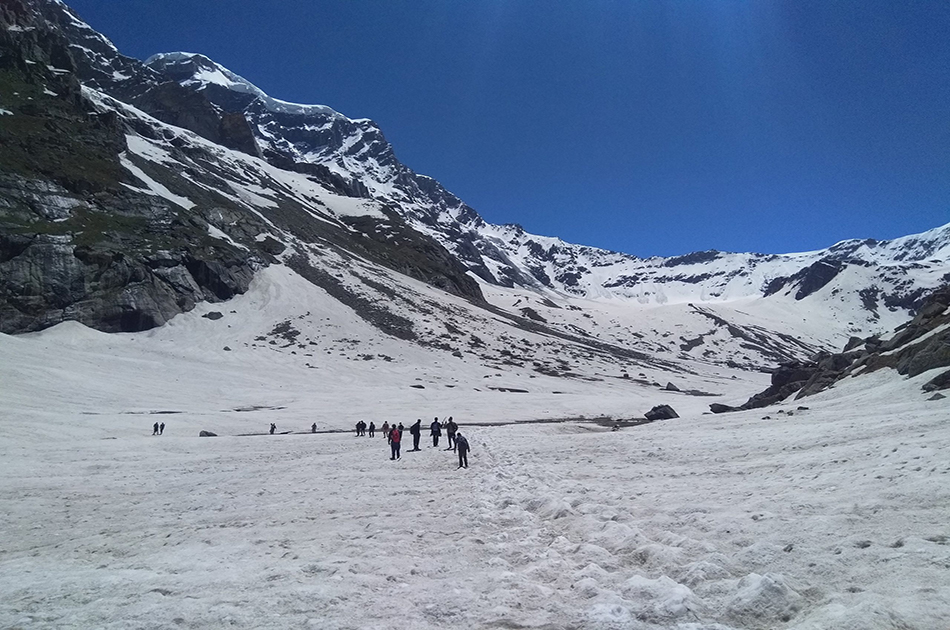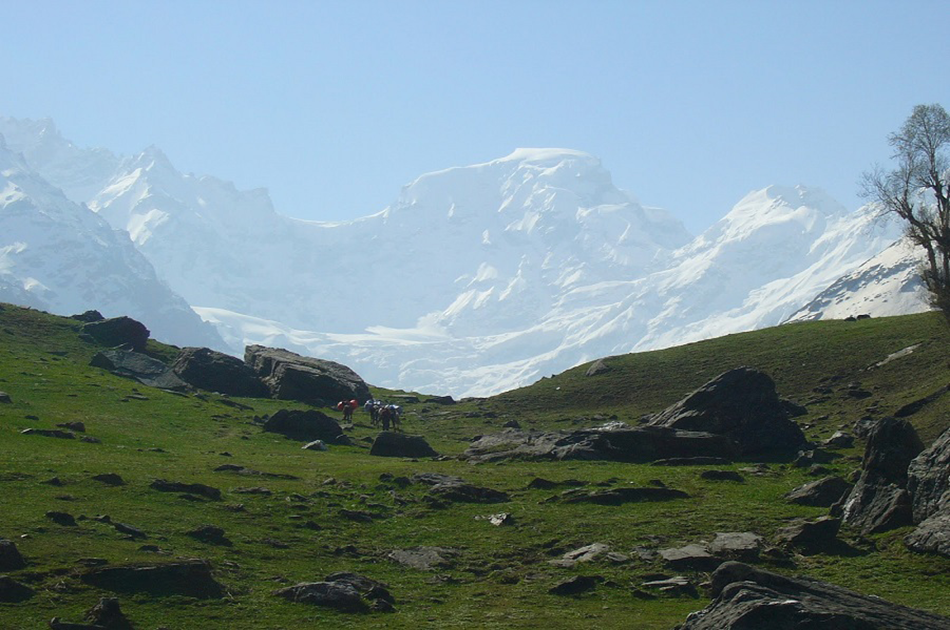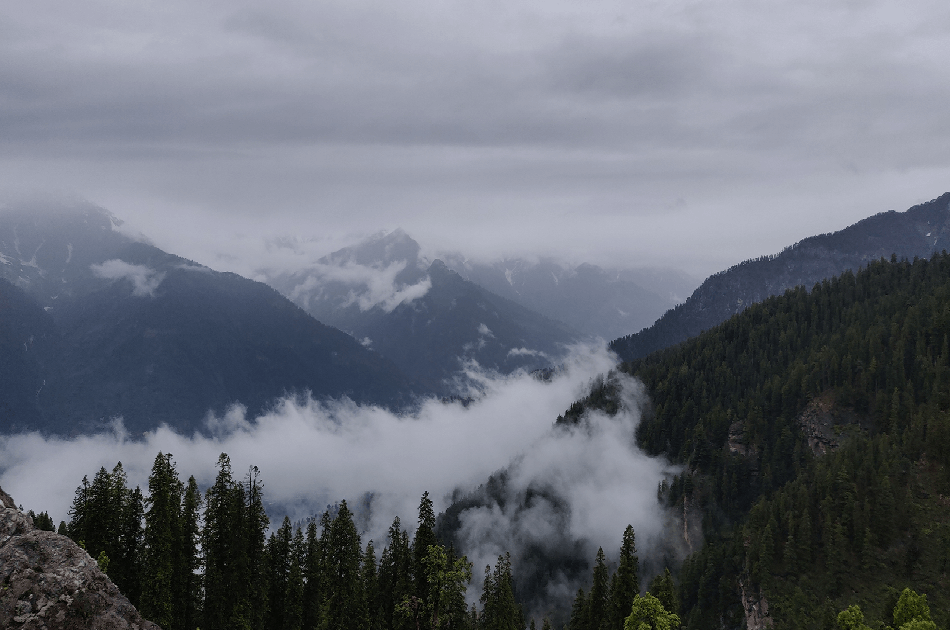About
At 6001 metres, Mt. Deo Tibba is the second highest mountain in the Pir Panjal range
in the Kullu valley, located southeast of Manali above Jagatsukh hamlet. According
to legend, Deo Tibba is the meeting place of the gods, and the ‘Devtas’ are said to
reside atop this summit. Despite the fact that it is a significant climbing
adventure with a massive ice cover on its top, the approach and logistics are rather
simple. Mt. Deo Tibba, at slightly over 6000 metres, has a large ice cap at the
summit, however the real summit is reached through a snow hump on the ice plateau’s
edge. This trip entails traversing an ice pass on the way to a glacier with a rocky
moraine on a high slope of roughly 55 degrees that requires fixed ropes to safely
traverse. Mt. Deo Tibba trip is intended for experienced trekkers with prior
understanding of mountaineering skills such as the use of ice axes, crampons, and
rope up processes due to its hard terrain and expedition style hiking. This
excursion is ideal for any ambitious climber looking to prepare for peaks of 6000
metres or higher in the Indian Himalayas.
Itinerary
Things to Carry
• Footwear: The trekking boots which must be waterproof and snow proof, normal boots,
floaters, and woolen socks.
• Backpack: (50 ltr), Daypack (20-30 ltr), Duffel bag.
• Clothes: Jacket and trousers that are both waterproof and breathable. Jacket
(synthetic or down feather fleece), synthetic insulated trousers, poncho,
sweatshirt, inner thermal (upper & lower), fleece, t-shirts, cotton trekking pants,
shorts.
• Season wise Clothes:
• Hand and head protection includes liner gloves, bandannas, sun hats, woollen caps,
and face masks, among other things.
• Accessories: Sunglasses/goggles, anti-glare lenses, water bottle, hydra bag, and
headlamp with spare bulb and extra batteries are all recommended.
• Trekking Gears: Toolkit for an emergency. Sunscreen, a toiletry pack, water
purification pills, Ziploc packs, ear plugs, first-aid kit, and the necessary
medications are all recommended.
• Camping Equipment: Sleeping bags of lining (extreme -5 to +5 Celsius if you have
one), trekking sticks, and so on.
• Warm top/light micro fleece pullover/full sleeve T shirt – 2/3.
• Water resistant/repellent trekking pants with an inner lining for added warmth- 2
High-quality windproof/water-resistant outer shell (jacket) with a proper hood.
• Thick Fleece / Full-sleeve Woollen Jumper, Down Jacket with at least 600 fill
capacity Innerwear with a thermal component (upper and lower).
• Woolen hat, inner fleece gloves, and outer water-resistant gloves.
• 4–5 pairs of thick woollen socks and standard socks, scarf/muffler (optional)
• Waterproof Trekking/Hiking shoes with a thick heel and high ankles that are
comfortable to wear. Sneakers/sport shoes are ideal for camp.
• Poncho or raincoat. A small, light-weight towel.
• A hydration pack and an insulated water bottle (optional)
• Sunglasses with UV cover and the potential to cut light, as well as a cap or
floppy hat to shield the strong sun off your skin (important when traversing through
snow)
• Trekking pole or sturdy walking stick Lip Balm, Sunscreen Lotion
• Flashlight / torch (with extra batteries) Medications, if any special prescription
is needed Toiletries for personal use
• Carry a rain cover over your luggage • Day pack/small bag that you can carry on
your back all day to keep your essentials in
• Keep a few poly bags or plastic containers in your bag to place your things in if
you need to in case of heavy weather.
Personal Medical Kit (MANDATORY FOR ALL)
• 10 Diamox tablets (to prevent AMS)
• Nifedipine – 5 pills Dexamethasone – one strip
• 6 tablets of Crocin (fever)
• 4 tablets of avomine (motion sickness) 4 capsules of Avil 25mg (allergies)
• 4 tablets of Combiflam (Pain killer)
• 6 tablets each of Norflox TZ and Lomofen (diarrhea) 10 tablets of Digene
(acidity)
• 10 Omez/Rantadine capsules (antacids) 3 to 5 metres of crepe bandage
• Keep a few poly bags or plastic containers in your bag to place your things in if
you need to in case of heavy weather.
• 1 tiny roll of gauze 10 strips of bandage 1 small roll of cotton 10 packets of
ORS
• Moov spray Betadine or other antiseptic cream (aches, & sprains)
• If you're vulnerable to knee injuries, you should wear a knee cap. Powder with
antifungal properties
What we'll give/What we won't:
Cost includes:
• Pick and Drop Service from mentioned location.
• Fees for the guide and the chef.
• Camping facilities' rent.
• Entrance fees to the forest.
• To transport camping gear, a porter and mule are required. Please keep in mind that
personal baggage can be borne by mules and/or porters for a fee.
• Sagarmatha National Park Entry Permit.
• From the first day's dinner until the last day's brunch, both of the meals are
vegetarian.
• Throughout the walk, you'll be staying in a tent or if possible, then in a guest
house.
Cost Excludes:
• No pickup and drop point from/for your hometown.
• Personal costs include things like tips, personal medications, and conference
calls, etc.
• Apart from what is mentioned above, some transportation assistance during the
trek.
• Porters/mules can carry personal luggage weighing up to 12 kg per bag per person
for Rs 350 per day per bag.







